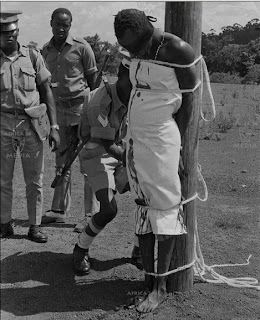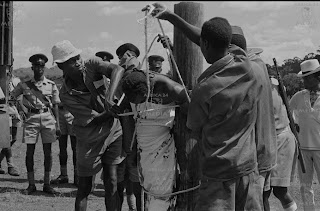
My father was called Martin Okello, he was the first MP West Nile Madi region. The soldiers came to our home and did not get him, they followed him where he was in the evening with his friend called Gaspero Oda, and they were taken to River Obongi and murdered. Their badly decomposed bodies were discovered because of the strong stench, he was buried at Ediofe Cemetery, may his soul rest in eternal peace. (Identity of Victim is withheld)
"I am what I am now because i lost my father at that early stage, otherwise i would have been somebody better than what i am now, the tears that my mother shaded while looking after us still rings in my mind, the only thing our mother taught us forgiveness. May the souls of my parents rest in peace. (Identity of Victim is withheld)
At the cemetery in Ediofe Arua visiting my late
father the late Hon. Martin Okello



